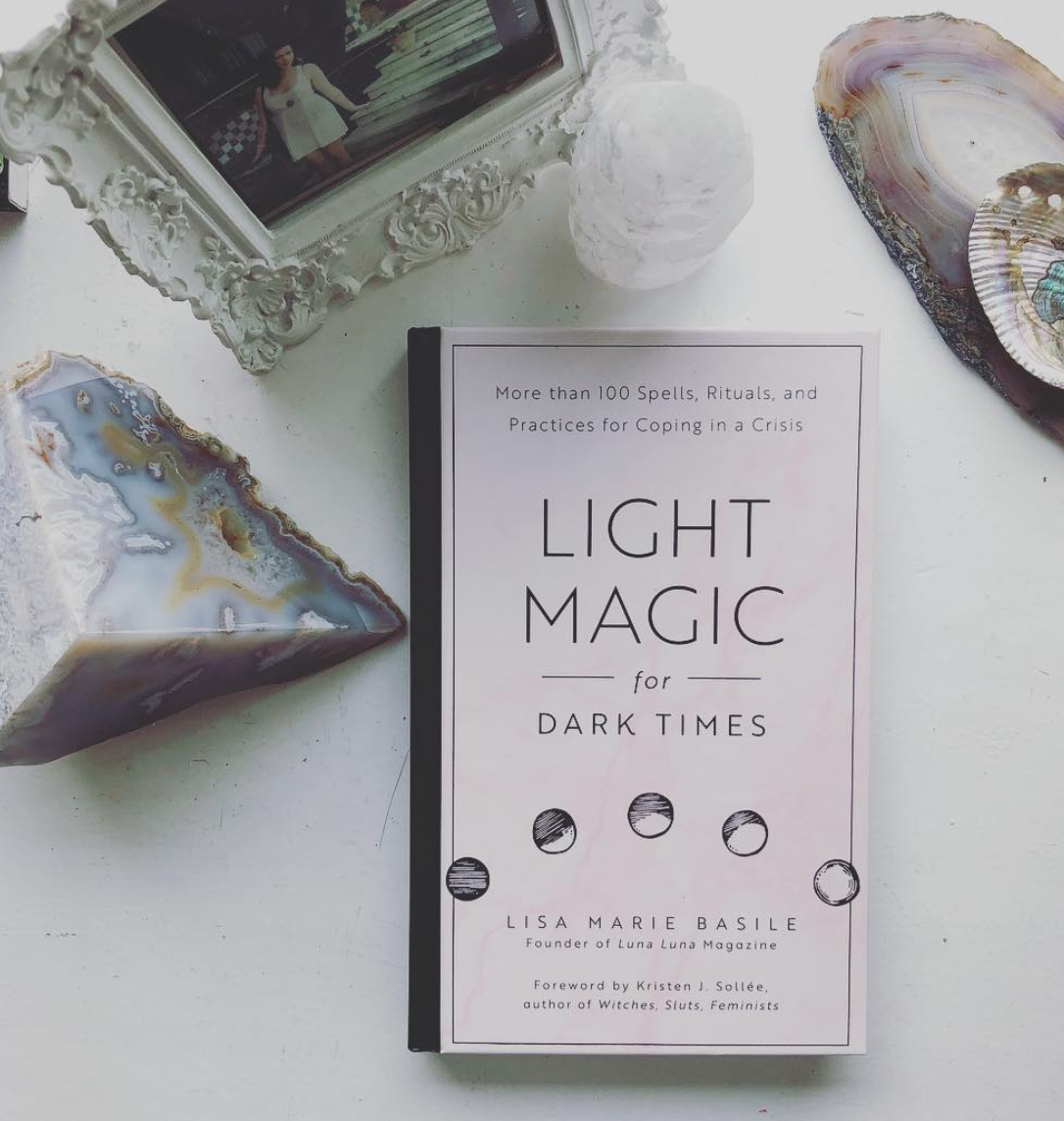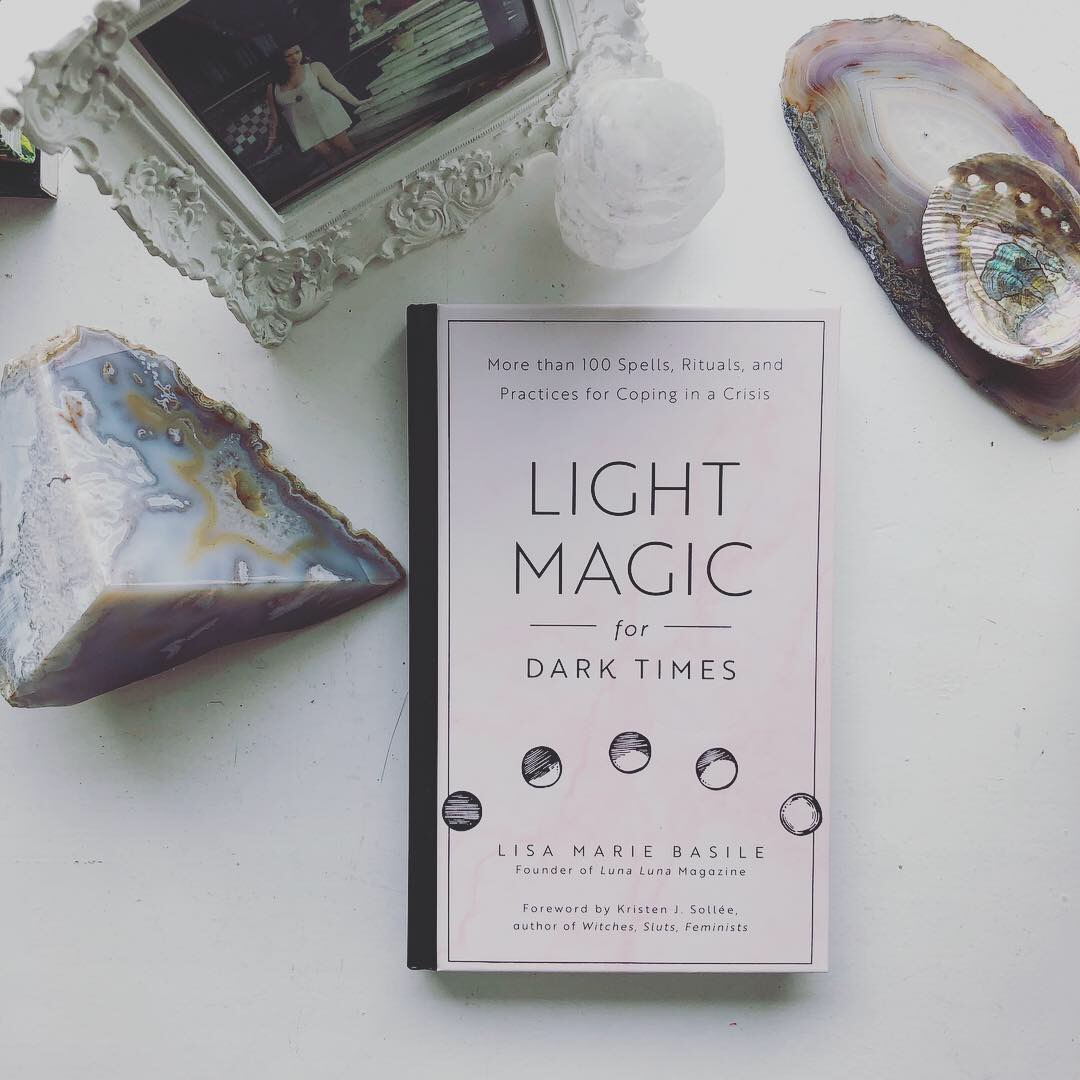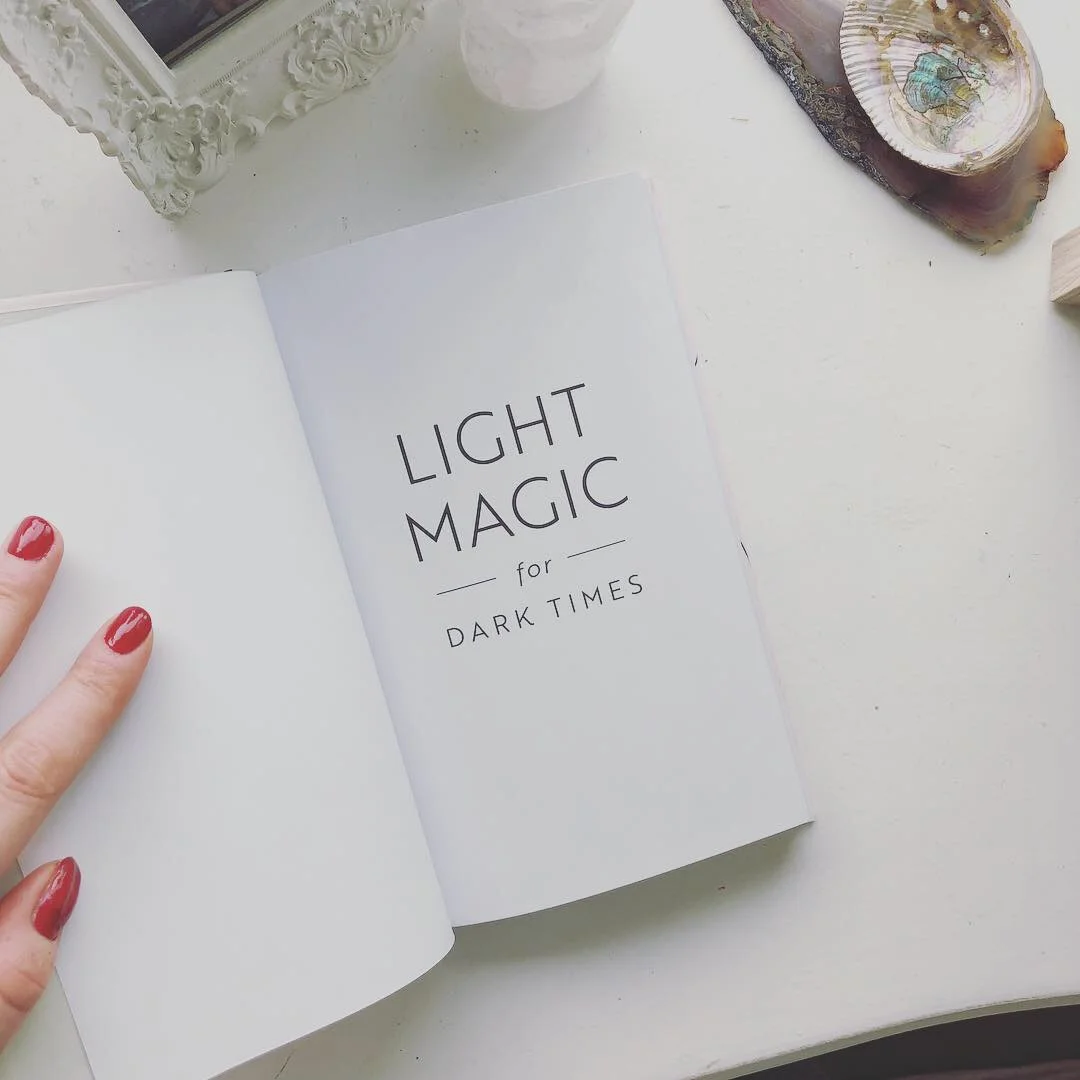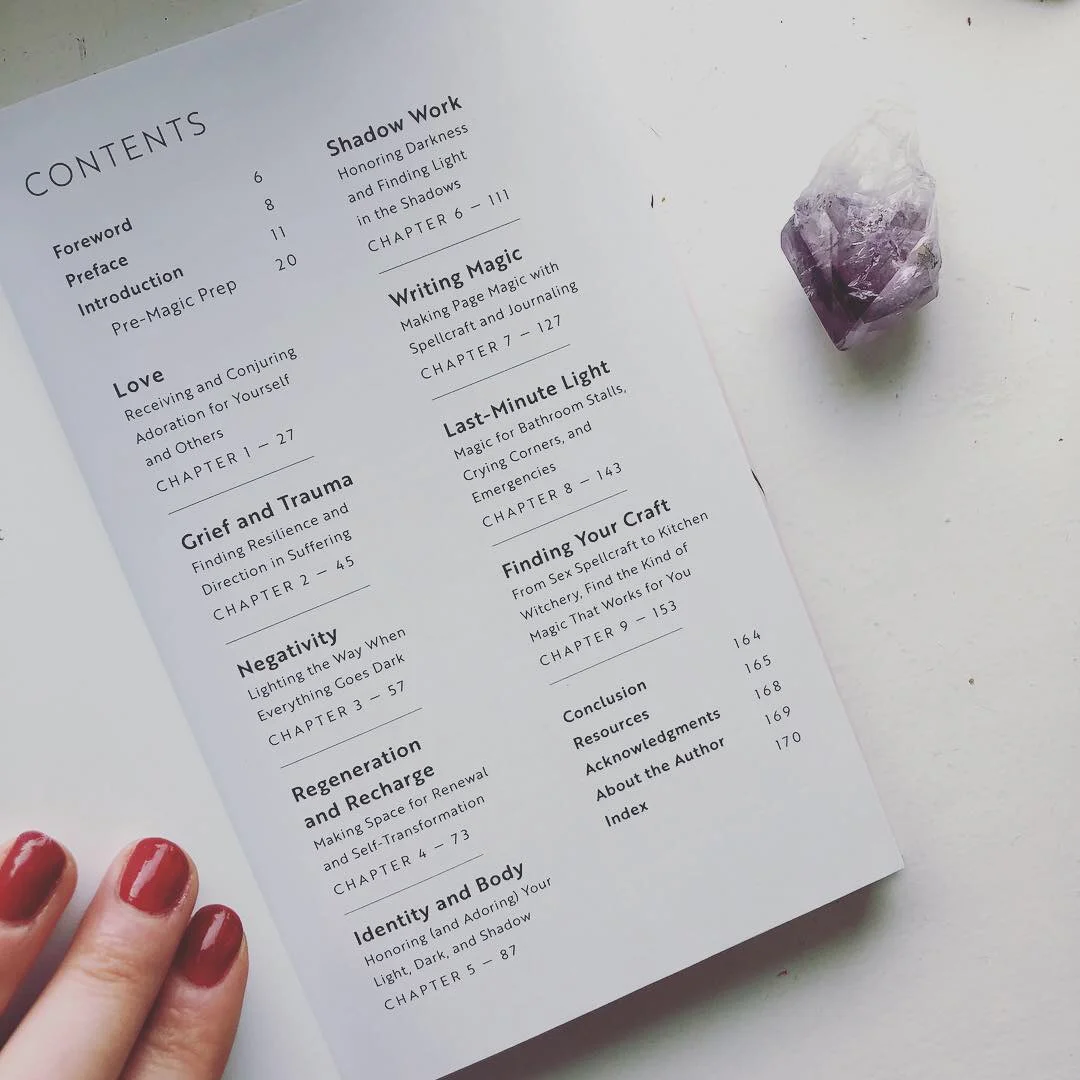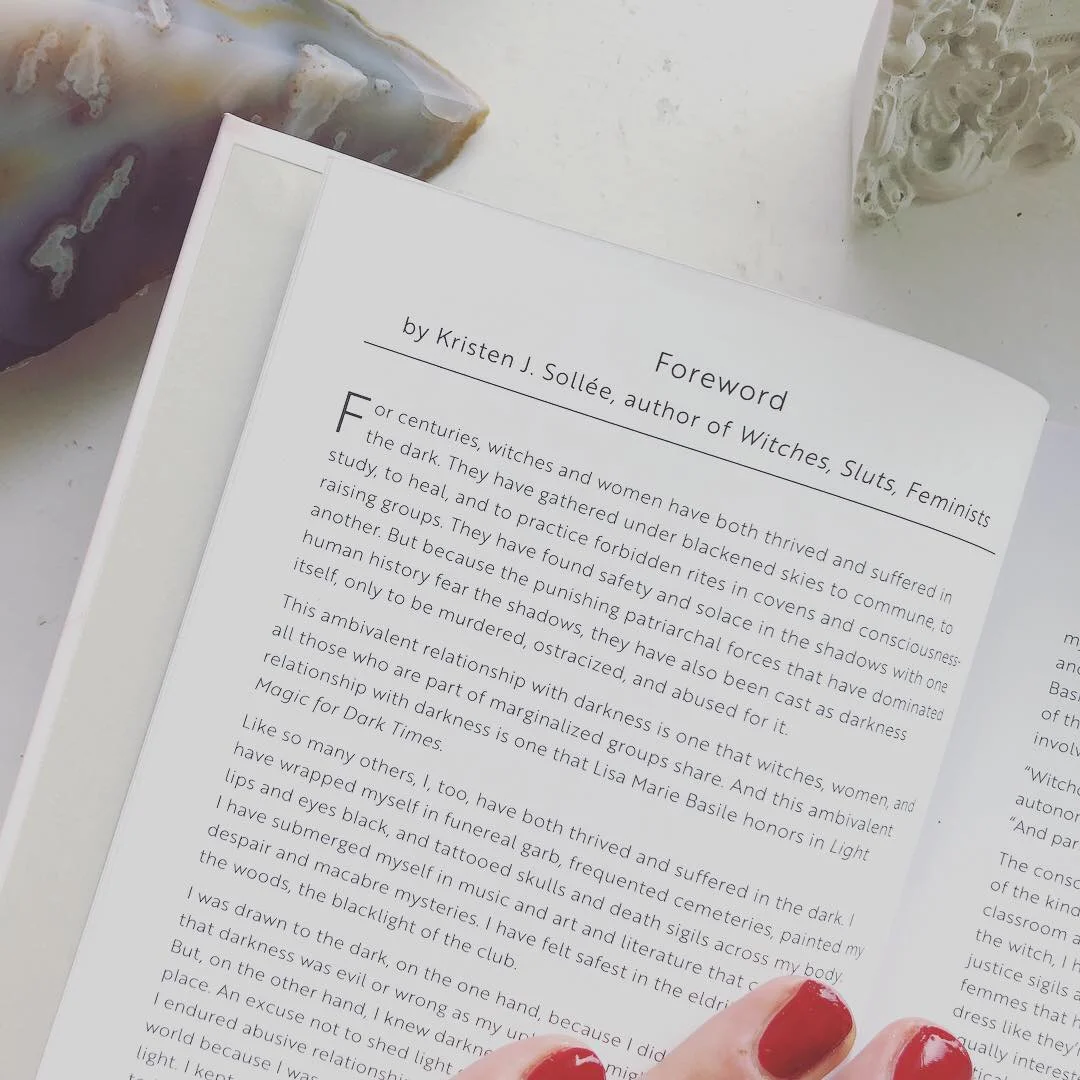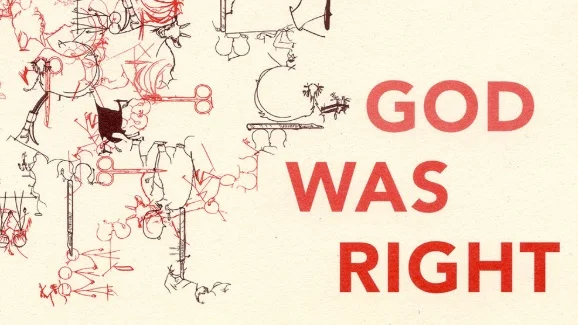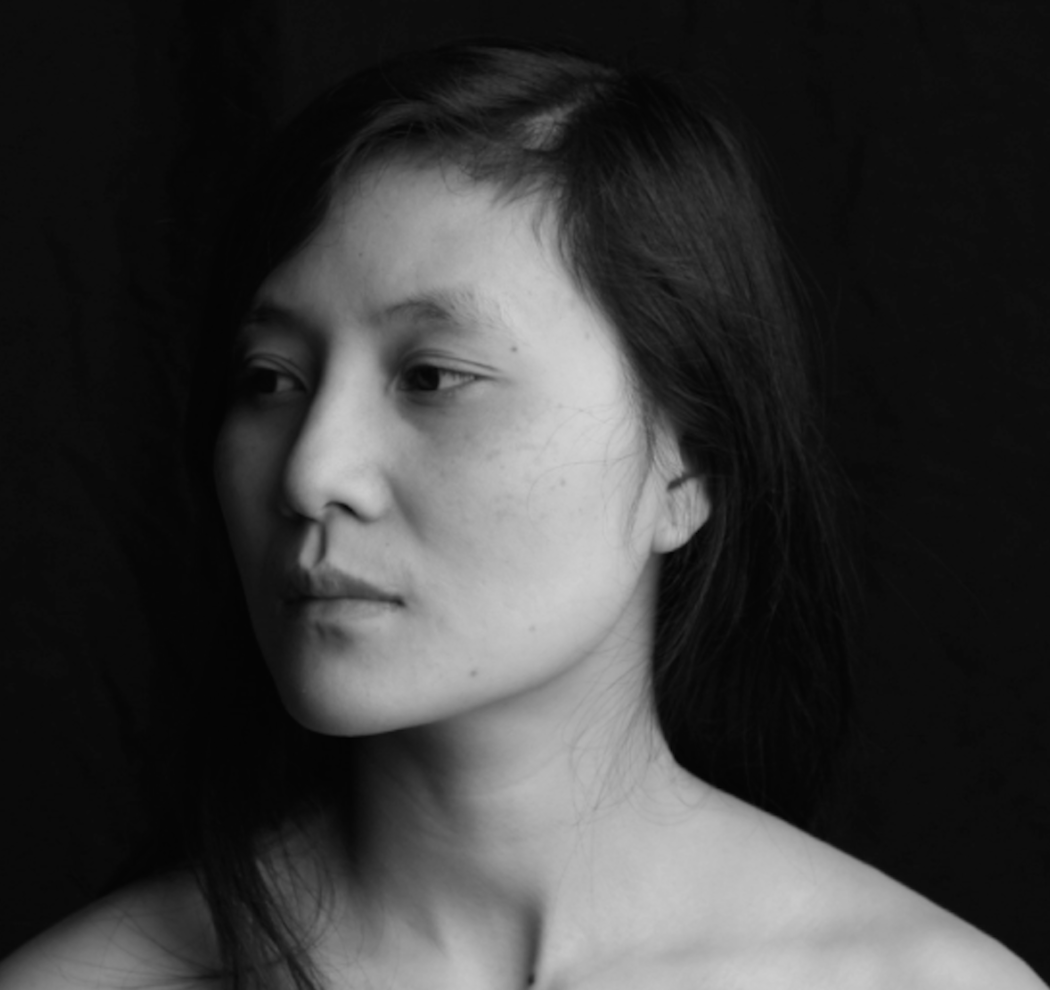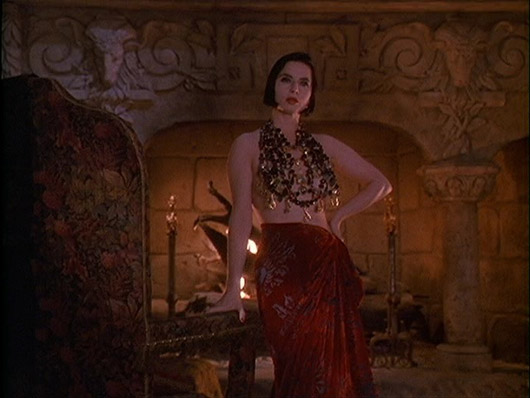Brandon Amico is a writer whose debut collection of poems, DISAPPEARING, INC., is forthcoming in March 2019 from Gold Wake Press. He is the recipient of a North Carolina Arts Council Regional Artist Grant and the Hoepfner Literary Award for poetry, awarded by Southern Humanities Review. His poetry can be found now or soon in journals including The Awl, The Adroit Journal, Blackbird, Booth, Copper Nickel, The Cincinnati Review, Diode, Hayden’s Ferry Review, Hunger Mountain, Kenyon Review, New Ohio Review, Sixth Finch, Slice, Waxwing, and Verse Daily, and his reviews have been featured by 32 Poems, AGNI Online, The Los Angeles Review, Mid-American Review, The Rumpus, and Southern Humanities Review.
A Grimoire For Self-Love: A Peek At Light Magic for Dark Times
BY LISA MARIE BASILE
Welcome to a sneak peak of my grimoire of self-development and ritualized living!
Though the archetype of the witch is part of what inspired LIGHT MAGIC FOR DARK TIMES, it’s also a book of what inspired me about people I love and care for, like my mother, who has had to grow and regrow several times over; like the people I know who have used their voice for personal and community change in the face of systemic oppression. It’s a book of love and care, of rebellion, of reclamation, and growth. That energy is magic.
I wrote LMDT after an editor actually spied a ritual of mine here at Luna Luna and asked me to expand on it— and so it is, in many ways, the unofficial Luna Luna grimoire.
Here are all the places you can pick up the book. And here’s a look at what’s inside:
Light Magic for Dark Times is all about ritualizing your life and finding your inner magic — by embracing the light and the shadow together.
It was written as a guide through the self.
The chapters cover everything from journaling and sigil creation to finding your own personal magic and integrating daily ritual.
The foreword was written by the inimitable Kristen J. Sollée. You should read her book, Witches, Sluts, Feminists: Conjuring The Sex Positive.
Because I’m a poet, you’ll see a lot of literary references woven throughout the book.
Light Magic for Dark Times is for the rebels, dreamers, shadow-dwellers, thinkers, darklings, & light-seekers amongst us.
You can find more inside peeks below
Lisa Marie Basile is the founding creative director of Luna Luna Magazine and the most recently the author of "Light Magic for Dark Times” and "Nympholepsy." Her work encounters the intersection of ritual, wellness, chronic illness, overcoming trauma, and creativity, and she has written for The New York Times, Narratively, Sabat Magazine, Healthline, The Establishment, Refinery 29, Bust, Hello Giggles, and more. Her work can be seen in Best Small Fictions, Best American Experimental Writing, and several other anthologies. Lisa Marie earned a Masters degree in Writing from The New School and studied literature and psychology as an undergraduate at Pace University.
5 Books I Had No Idea Existed and Must Find at Once
Tiffany Alexander is a poet who has recently branched out into writing screenplays. Her goal is to put out more stories about mother and daughters of color into the world of Horror. She is currently working on a different spin on the haunted house movie
Read MoreVi Khi Nao Reviews Diana Hamilton's God Was Right
WAS DIANA HAMILTON RIGHT ABOUT GOD WAS RIGHT?
God Was Right (Ugly Duckling Press, Nov, 2018) reviewed by VI KHI NAO
How do I begin a review with the assumption that
my readers have read the collection already? How to
write a purposeless review…
By doing it this way:
I think God Was Wrong, but Diana Hamilton might be right
in that the absence of a cat may have shaped the title of this collection.
Rhetorical questions are not bound by the rules of wit. T
hey, they are governed by the law of absence.
To make something present by denying it. G
od is not here with us to prove if God was right.
So please take advantage of the situation.
But Hamilton is right here and it seems like we should listen to her.
Is this what Hamilton hopes to achieve with this narratively charged body of poetics? Surely not.
What language shapes the constitution and ontological fabric of her consciousness and super-subconsciousness such that the title of her collection is bold and ambitious and comedic and quietly enigmatic, reflecting and revealing the elaborate emotional, philosophical sector of its content? Well, don’t answer that. The question is too much.
The answer is the language of falling in love with friends, how cats are not designed to make us suffer (though if they die, they will), acceptance and obesity, rape jokes are okay, it’s hard to pay rent, sleeping with landlords is important for survival, yay to Bakhtin and fictional poetry, men have the potential to misunderstand (gynecological) yeast infections, buying inexpensive earrings and feeling fiscally self-conscious about their lack of social and fiscal value should be condoned frequently, there is no right way to superglue an ear to an animal. You just need to do it. Especially if you are an animal lover. So it can listen to something better.
I emphasized or clarified “gynecological” because for a while I thought “yeast infection” was a baking condition where bread had a phallic problem and had a hard time rising.
This answer makes no good argument for Madame Bovary.
Readers of Hamilton’s work do not necessarily require a large appetite for the long form, they just need some literary cows and a decent philosophy on bad writing and Hamilton is more than willing to assist with the misguidances, misalignments.
Hamilton excels in the long form.
This is an understatement, as demonstrated by her eloquent, aesthetically streamlined, compelling chapbook Universe, published three years ago, also by Ugly Duckling Presse. Useful to couple her chapbook with this collection.
I read her chapbook in one afternoon in South Bend, IN and now her full-length in Iowa City, IA over a cloudburst of a month.
No matter where on earth you read Diana Hamilton’s work, there are two certainties: God Was Right and God Was Wrong.
Since God Was Wrong hasn’t been written or published (I even tried to find such a title on Amazon, but all I found was I Was Wrong (touché, God, touché), as if platonic marriages are even legal,
you have a higher chance of enjoying your non non-existent reading experience more if you read Hamilton’s God Was Right first.
Hamilton’s essayistic poetry operates, yes, on a language level, but perhaps her work here is better described as rejuvenated logic made sense of by intellectualized senselessness and emotional intelligence. Choose one but not both. In other words, to suffer (for the sake of animality, yeast infections, existence, the death of a beloved cat, feminist soundbites in an era of misunderstanding and defensiveness, epistolary devotion, Sapphic detours, cat hugs or kisses), one must dominate hangovers and heartbreaks of form and transform them into “six months of incredible sexual pain” along the river of an imaginary epistolary kingdom.
If thoughts were parentheses, then Hamilton’s God Was Right is full of them.
Diana Hamilton’s intelligent and poetic essays operate like a Russian Doll, or rather a closet inside of a closet inside of another closet when she is already outside of the closet (literally and figuratively). To open the bedroom doors of her intelligence, you must open every floor inside of a 60+ story building where the elevator only works right when you are going down. You climb the stairs into her well-maintained, but somewhat combed, sentences until you run out of breath and then you do it all over again. There are eleven of these in this collection! You can and probably should start with her “Autobiography of Fatness” and then maybe skip floors. Or start with her “Essay on Bad Writing” which she read at a reading in Iowa City. It’s deliriously awesome and funny, which is to say: because of Diana Hamilton, essays don’t have to be tedious, too academic, full of prose blocks, and boring anymore. Avoid reading the last poetic essay with identical title “God Was Right” first. You may be forced to see why God Wasn’t Right for the right reasons. You are not ready for something Easy. Weed through the Hard stuff first because Easy is actually Hard.
More notes for a potentially well-written review of God Was Right:
God Was Right is a visual philosophical treatise on E.E. Cummings’s “Since Feeling Is First”…. "for life's not a paragraph/and death i think is no parenthesis"
God Was Right or How To Marry Your Platonic Friends in Poly-culture Where Women Are Allowed To Write Bad Poetry And Have The Courage To Encourage Men To Write Bad Poetry Too.
Some semi-remarkable lines from her book that I love. I say “semi” not because they are not brilliant. They are brilliant when they stroll in the right neighborhood of context. Context is content here, folks. In context, these lines are obesely beautiful:
p.31 : “They’re too well written to seem seriously engaged in risking the self.”
p.85 : “I want to love a man without holding his heterosexuality against him.”
p.85 : “God was right when he made us/ want to marry each other”
Advice on how to read the rightness of God:
Treat it more like a toy or a wedding ring than a book.
Play around with it. Touch it. Don’t smell it. It’s not a dog and it can’t bark.
Treat it like a cat that will not stare at you especially when you are naked and reading it while self-conscious.
Oh, libraries of cats.
In preservation of books.
VI KHI NAO is the author of Sheep Machine (Black Sun Lit, 2018) and Umbilical Hospital (Press 1913, 2017), and of the short stories collection, A Brief Alphabet of Torture, which won FC2’s Ronald Sukenick Innovative Fiction Prize in 2016, the novel, Fish in Exile (Coffee House Press, 2016), and the poetry collection, The Old Philosopher, which won the Nightboat Books Prize for Poetry in 2014. Her work includes poetry, fiction, film and cross-genre collaboration. Her stories, poems, and drawings have appeared in NOON, Ploughshares, Black Warrior Review and BOMB, among others. She holds an MFA in fiction from Brown University.
DIANA HAMILTON is the author of three books—God Was Right (Ugly Duckling Presse), The Awful Truth(Golias Books), and Okay, Okay(Truck Books)—and four chapbooks, including Universe (UDP). She writes poetry, fiction, and criticism about style, crying, shit, kisses, dreams, fainting, writing, and re-reading. You can walk through audio recordings of her dreams in the first-person shooter by Alejandro Miguel Justino Crawford in Diana Hamilton's Dreams (Gauss PDF). Her poetry and critical writing have appeared (or are forthcoming) in BOMB, Lambda Literary, and Social Text Journal among others. She received her PhD in Comparative Literature from Cornell University, and she currently works as the Director of Baruch College’s Writing Center.
Poetry Weekly: Omotara James, John Murillo, E. Kristin Anderson
Joanna C. Valente is a human who lives in Brooklyn, New York. They are the author of Sirs & Madams, The Gods Are Dead, Marys of the Sea, Sexting Ghosts, Xenos, No(body) (forthcoming, Madhouse Press, 2019), and is the editor of A Shadow Map: Writing by Survivors of Sexual Assault. They received their MFA in writing at Sarah Lawrence College. Joanna is the founder of Yes Poetry and the senior managing editor for Luna Luna Magazine. Some of their writing has appeared in The Rumpus, Them, Brooklyn Magazine, BUST, and elsewhere. Joanna also leads workshops at Brooklyn Poets. joannavalente.com / Twitter: @joannasaid / IG: joannacvalente / FB: joannacvalente
Brandon Amico on Why He Doesn't Want to Be Unreachable
Brandon Amico is a writer whose debut collection of poems, DISAPPEARING, INC., is forthcoming in March 2019 from Gold Wake Press.
Read MoreHow To Become A Freelance Writer: On Starting Out, Discipline & Ritual
BY LISA MARIE BASILE
Welcome to another installment of Lisa Marie Basile’s column Wild Words, an everyday, accessible, friendly series of how-tos around publishing, writing, and creating. It’s a response to the many inbox queries we get around writing (a lot of our readers come here for the literature, and also want to write!). There is no way these entries can be totally comprehensive, but it’s aimed to provide a general overview of any given topic. Feel free to leave questions (and additional advice!) in the comments below or tweet us at @lunalunamag.
I have been a full-time freelancer twice in my life: Once, by sheer goddamn necessity (no one would hire me; I was out of graduate school loaded with debt and was somehow either “over-qualified” or “under-qualified” at the same time) and right now, by choice. I’m freelancing these days because my chronic illness was getting out of hand, and my last job had me falling into a deep existential abyss. I swear I’m not being dramatic. Okay — maybe a little.
But in all honestly, freelancing has helped me make time for my health and wellness, keep doctor’s appointments, and explore my own projects with greater focus (since I don’t commute). On the other hand, balancing the finances — and not getting insurance through work or a steady paycheck — are the trickier elements. All said and done, I’m privileged to have the opportunity to do this, and I realize everyone’s situation is different and complex.
Over the years, I’ve had the pleasure of writing for The New York Times, Healthline, Chakrubs, Good Housekeeping, The Establishment, HelloGiggles, Bust, Bustle, Sabat, The Vitamin Shoppe, So Yummy, Greatist, Byrdie, The Fix, Refinery29, Cosmo, and so many more. I’ve also edited essays and content for Hearst Digital Media and The Vitamin Shoppe and I’ve worked as the content director at a content marketing agency, among other roles.
So, my friends — here’s what I’ve learned from diving head-first into the full-time freelance lifestyle. There’s no way this covers everything, but it’s a start. Feel free to tweet me or Luna Luna or leave a comment below if you have additional tips and tricks you want to share with our readers!
Prep before making the leap into freelance.
Before jumping head-first into full-time freelance (or freelancing while also working) prepping ahead is super important. Anticipating a challenge means you’ll be less likely to freak out, give up, and then wonder why you’re not good enough to pull off the freelance life. Hint: you are totally good enough — capitalism is hard!
Some pre-freelance prep steps are way harder than others (like, managing your finances), so just be aware of that coming into this way of life.
Save some of your money, if possible. If you want to quit your job and start freelancing, it’s probably wise to save what you can while you’re still working so you have a cushion. Not everyone has family to lean on, a nest egg or a supportive spouse. This isn’t possible for everyone (and it wasn’t for me), and that’s where things get tricky if you don’t have a few gigs or leads lined up when you make the leap. One of the things that happens when you become a freelancer is that your pay will be all over the place. Some clients pay 90 days after you invoice while others pay right away. A steady paycheck is (sadly) not the norm, but you can ask each of your clients if they would be willing to modify their pay system so that your paycheck comes more regularly (or before rent is due, for example). More often than not they will not do this, so it’s wise to diversify your assignments so you always have a steady stream of money coming in. This by far has been the hardest element for me to deal with.
Start applying for freelance gigs while you work; this is like collecting acorns for your eventual departure. You do not want to find yourself stranded in the freelance sea without a clue as to where the shore is. Make connections, put your feelers out there, and make long lists of specific editors, marketplaces (websites or magazines), or other gigs before making the leap.
Get an author website and blog. If you are starting completely out of nowhere (without ‘clips’ or sample work), you’ll want to make sure you have something to show for yourself. A good idea would be to start a website with a blog page. Make sure your site is neat, clean, well-organized and well-written. No wonky fonts or colors. Clean is better so that everyone can view it on any device. You should include a page with a short bio, a page with links to any previous work, and a page with some details about what services you offer.
Here’s mine, and here are some other examples. I love Squarespace (which Luna Luna happily uses!) for website design and blogging; they offer affordable options, well-designed themes, multiple interactive options, and a chicness that goes a long way. Weebly is also really nice for drag-and-drop (read: simple) design.
Your blog (which is a page on your website) should be focused on a few topics that fully emphasize your interests and abilities. For example, you might start a blog about nutrition, fitness, and meditation. You would then be a ‘wellness’ writer with a few focuses. If you have nothing published (but need to show clips to potential editors when applying for gigs) you should write a few really good articles for your blog — ones that underscore your focuses as a writer. Use your voice. Tackle a longer topic and shorter ones, too. Show range.
First, calculate what you need to earn.
Money stuff is going to differ for everyone, and this is also going to be the part where you need to figure out your priorities. For me, it’s rent, health care, travel, and food. Everything else is second-tier, and thus not figured into my basic ‘needs’. Your financial priorities may be different. (Here’s a calculator).
Find anchor clients.
When you’ve figured out how much you need to live more or less ‘comfortably’ you’ll want to start searching for anchor gigs. Anchor clients are your bedrock; they provide the bulk of your earnings. I have two anchor clients — a media company and a doctor’s office for which I blog. They either pay me a set amount per month — an amount I can rely on to pay the bulk of my bills — or they provide steady, reliable work I can count on.
My other income sources come from a handful of not-so-steady freelance clients or one-off assignments. You should absolutely look for one-off gigs or less reliable gigs that can help you fill any income gaps. I am also always looking for anchor clients if I have the time to devote to them; the more work, the more security.
A word of warning: Once you get more established, make sure you say no to what doesn’t serve you. Think about your rate per piece; is it too low for the output? Don’t burn out. Be picky when and if you can afford to be. There will be times when you must say no to a gig, and times when you, well, need to take the work. This is the wild and wacky world of freelance, darlings!
The start might be rocky, but your experience will grow and evolve.
It sounds like a cliche — and it’s not always true — but sometimes we have to start from the proverbial bottom. I definitely did. For one, it’s hard to get high-paying gigs without experience. Two, it’s hard to get any experience without experience — which is a catch 22, I know.
For a long time, I couldn’t get paying gigs, so I started out writing for local blogs and friends’ blogs for free. Soon after, I started writing for content mill sites like Demand Media and ehow.com, along with media companies that needed daily write-ups for a handful of niche blogs.
I started out earning about $5-$10 per article or per hour. I wrote about celebrity cookbooks or toaster ovens or funeral home services or about how to plan a kid’s themed birthday party. Basically, if someone handed me money, I’d write about almost anything.
I slowly grew in the earnings area. The gigs were not glamourous, but they helped me pay the bills. Some people might say certain rates are an abomination; others may find lower rates normal for a new writer — it all depends on where you live, your living costs, and the kind of writing you do. It’s also in no way cool to shame people for the pay rates they accept.
I got most of my gigs by surfing Craigslist (which is less helpful these days) or connecting with writers, editors, and friends who worked in media. I’d also send emails out to everyone I knew to see if they knew someone who might need help. Today, gigs can be found through great Facebook groups like Binders or through places like Contently, MediaBistro, Ed2020, and LinkedIn.
Today, I command much more money per article (or per word), but I still sometimes write for free (like this very article!) or for below-industry-standard rates. These are the sorts personal choices I make because I either love the client or the experience is really important to me. You’ll probably have to navigate these situations as a freelancer as well.
It’s not always fair to work for free, but it can help you get a few clips together for a portfolio. Now, it’s not always worth your time, energy, or effort to write for cheap, either— especially, if like me, you have a chronic illness or familial demands to manage. That said, where and how you spend your energy is up to you, and will continue to evolve as you grow in your freelancing life. The more you freelance, the more negotiation prowess you earn. Sometimes, in my experience, the less glamorous gigs lead to more opportunities in the future. For example, I’ve worked on Luna Luna for five years — unpaid — and it’s helped me secure plenty of opportunities. I don’t recommend that for everyone, but it’s one thing I do at night and over weekends (when I have the time) that has helped tremendously. (See: Get Creative below for more).
That said, no matter where you are in your freelance career, I firmly believe in the “asking for more is harmless” approach. Ask politely for the rate you want. Ask for the rate to be reconsidered if what’s being offered is too low. Know your worth; you may not have much experience but you may know that you are a damn good writer. This is worth fighting for!
I don’t use a ‘rate card’ (a card with my rates for specific projects) for this reason; my rate changes per client and per project. However, going in with a ballpark helps. My tip: Check the very helpful Writer’s Market for industry standards.
The bottom line: Be flexible. Be understanding of a company’s budget restrictions. Be willing to grow from where you are. All while advocating for your worth.
You’ll likely need to do an edit test when applying for gigs.
Most editors will want you to do an audition article when you apply to be a regular writer. For most of my edit tests, I’ve been asked to write a short article and include about a dozen potential pitches specific to the site. This helps the editor understand where you’ve got the site’s tone, voice, and niche down. For one-off articles, though, you don’t need to do an audition in most cases.
Know your worth.
Depending on your experience level, education (I’ve found this matters way, way less; most clients want skilled writers with some experience, versus education), and other variables, you can position yourself as an authority on certain topics. Always advocate for yourself, and know that asking is the key to getting.
On top of self-advocacy, it’s key that you help others, too. Give people job connections when you can, and share what you’ve learned, too. Generosity begets generosity, and it creates a good foundation for your work and life.
Find your passion (and also what you can tolerate writing about).
I write largely about wellness and chronic illness, intentional living, creativity and literature, and trauma recovery. Those are my umbrella categories, so I try to focus on those in most of my work. This has sort of ‘branded’ me as a writer, making me more visible to certain editors or publications.
On the other hand, if I need to write about other topics for pay (which we all do), I’ve also secondarily done work in other areas. Be flexible!
Figure out who you want to write for and contact them.
Make a list of websites and magazines that you would like to write for, and start setting intentions to write for those markets.
You can usually find the masthead on any website or in any magazine, which will often lead you to an editor’s name and contact information. If you can’t find the contact info, google their name or use a Facebook group for freelancers to see if anyone has the information. You can also look for the editor on social media and ask them politely for their contact info.
You can build all of this information in an Excel or Spreadsheet file. The columns might be, “Publication,” “Editor name,” “Editor contact,” “topic or vertical,” “pitch ideas,” and “link” (which should link to their hiring information or anything that you might help you remember what they do or what they are looking for).
Smaller magazines tend to have smaller staffs; I find these folks easier to reach. Larger or more established publications tend to be way busier. Often, I don’t even get a response. It might be smart to reach out to an assistant editor or associate editor (or a section editor) rather than someone higher up on the masthead.
Your emails should be short and sweet. Introduce yourself, share your pitch or ideas (put ‘Timely’ in the subject line if it is timely), ask if they’re seeking regular writers, and include your credentials and contact information. Be voice-y, be authentic, and be convincing.
Heed this warning: Don’t ramble; an editor will glance at your email for maybe 10 seconds before they decide it’s right for them.
Follow up if the editor doesn’t respond. Always follow up. Never — and I’m sure I don’t need to say this, but hey, who knows — insult or abuse the editor if they fail to follow up. Editors are busy, and your email simply may not be of interest. In a perfect world, we’d all get responses. Hint: The world isn’t perfect.
Maximize the types of work you do.
You don’t have to limit yourself to websites and magazines. You can get creative — you can write and sell e-books , you can pitch pieces to printed anthologies, or you can pitch your services to a small company. My gigs have run the gamut: I’ve written for print magazines and for websites, but I’ve also written perfume descriptions and product names for Valentino, “About” copy for small businesses, and edited poetry for an anthology.
Hey, I’m about to start writing obituaries!
Create a productive and inspiring writing environment.
One of the most important things I do is make my space cozy, comfortable and aesthetically beautiful. I try to surround myself with things that make me happy and comfortable so that I don’t feel the need to clean or reorganize or pretty things up. (Writers get distracted easily).
If I’m working from home, I’ll have my tea ready to go, I’ll keep power items near me (like crystals and plants) and I’ll keep the lighting cozy and bright, but not not harsh. I love salt lamps for a magical, glowy touch.
Build ritual into your freelance life.
I spend most of my freelance days writing, pitching ideas to editors, building articles into content systems, researching, working on my own projects, and editing. Because successfully working from home is largely very dependent on your own discipline, ritual is deeply necessary.
I never used to give myself a chance to rest or recalibrate during the word day, so my early writing was sloppy, grammatically imperfect, and my voice was messy. Today, I have a much firmer grasp on both my writing and my freelance habits — and that’s because I integrate ritual and intentionality into my work days.
Some easy ritual ideas include:
Make a morning routine that gets your blood flowing, and your mind settled and clear. Pull a tarot card and meditate on it, do some yoga, light a candle and clear your mind while you drink your coffee, or simply deep breath before heading to your computer. I like to make coffee, watch some ASMR videos on YouTube while I stretch, and then make sure my surrounding are conducive to productivity. I light a candle, put some stones and crystals out, and get myself a tall glass of water.
Take breaks to stretch, breath and recalibrate. Your work — and your health — WILL suffer if you don’t step away sometimes. I often do my best work after a break.
Create peace and joy in your surroundings. Make everything conducive to your needs, both logistically and aesthetically. Neat and tidy areas are better for me, and plants and natural light help me feel good. When I didn’t have this in my earlier years of living in messy houses with loads of loud roommates, I’d find a local cafe with wi-fi and get to work.
Use sound. I use the Calm app (this is a paid version but there are loads of cheap or free ones — as well as YouTube videos) to listen to stories or soundscapes during my break. It helps me delineate my work - brain from my rest - brain.
You can find more rituals at my account for Light Magic here.
Get organized.
Stay organized, and get ahead of your distractions. I use several organizational and productivity tools, and I suggest you either try these or research similar ones that sync up with your needs. Seriously.
Google Docs to save all my work
bill.com to send invoices
The “Reminders” app on my computer to outline my assignments and due dates
Trello is a tool that helps you track your projects, make lists, and monitor your progress.
I use Noisli 2.0, which helps me improve my focus and productivity using ambient noise. I use the white noises to make me focus when noises are distracting. I also use a free app called “Sound,” which has an amazingly soothing “brown noise” that has been helping me focus (and nap) a lot lately.
I use the Pomodoro technique when I really can’t focus. (Some of us have ADD or ADHD). This technique emphasizes bursts of work in 25-minute increments, and I’ve found it super helpful. You can adjust the Pomodoro as per your needs.
And because I’m good at guilt (thanks, former Catholic background), I use Panda Focus, which pops up my to-do list whenever I open a browser. Yeah, I know.
Learn how to research & find accurate information.
It’s so important to learn how to incorporate research into your work. Even if you don’t write research-heavy work, simply knowing where to turn for solid information can help. I use official, expert-approved sites when I need ‘accurate’ information, rather than blogs, for example.
Some great sites include Help A Reporter Out, Journalist’s Toolbox, and this list of credible sources.
Understand the difference between a pitch and an assignment.
When you’re freelancing, you’ll want to be pitching ideas to editors (this might include a cold pitch to an editor you don’t know, or pitching to editors you already work with) in addition to receiving assignments from people who have hired you as a remote writer. Never just assume you’ll ‘get’ as assignment. While many pitches are rejected, it’s an important part of the freelance life.
I pitch out about 5-10 stories a week to a mix of publications I either write for or want to write for. Other times, editors who have brought me on as a regular freelancer will email me throughout the week with assignments. For other clients, I do X articles per month at a set rate. It’s all over the place — so be flexible and make room for all sorts of relationships!
Learn more about pitching here: Wild Words: How To Get Published & Feel Good About Your Work
Get social.
Although it may seem arduous or complicated or even inauthentic, it really helps to be active on social media. I’m sorry to say it, because I know some people equate it with the social apocalypse (and I don’t blame you!). I was confused when I started using Twitter; what’s the point? Who cares what I say? As I learned to use it over the years, it’s been really rewarding. I use it to engage with other writers and editors, I share my work, and I share others’ work.
Having a landing page — like Instagram or Twitter — full of thoughts and ideas and images, showcases your personality, your aesthetic, and your voice, and it lets editors know what they can expect from you.
In my many years on social media, I’ve gotten dozens of gigs. I even scored a book deal for Light Magic for Dark Times by being on Twitter (yep — my editor discovered my (unpaid) work on Twitter, read it, loved it, and asked if I wanted to write a book). Now, book deals may not happen to everyone, but the lesson here is this: Being visible does wonders for your freelance work.
Confused on where to start? Find some of your favorite writers and editors on Twitter and see how they use the platform. You can always follow me on Instagram, on Twitter, and on Facebook! PS: Luna Luna’s FB group The Luminous is a treasure trove when it comes to connecting with freelancers and bouncing ideas around.
You’ll also want portfolio, which is a place you can store images of print articles or links to digital work. I use Contently, but a lot of people I know also use Muckrack.
Don’t be afraid to reach out.
Never think you’re too green, too unknown, or too inexperienced to reach out to an editor; editors want your pitches. If you have a good idea, send it along. (My only suggestion here: Make sure they haven’t published the piece already!).
The only way to go wrong is to reach out without politeness or with an air of entitlement. A little humility, kindness, and willingness to converse goes a long way. You can start by connecting with me on LinkedIn!
Get creative.
Most people aren’t going to land a 3000-word glossy magazine print piece right off the bat (but who knows, right?). Because of this, it’s smart to think outside the box a little: Go to writing conferences and meet people, design unique business cards that get people excited about you, reach out to your local gym to see if they need bloggers or copywriters, or ask your college alumni magazine if they need writers. I started Luna Luna (which is about as niche as it gets) — and that did wonders for my career! You never know who needs help or who is looking, so never underestimate the opportunities that are out there if you get creative.
Constantly learn and grow your skillset.
In the beginning, I had no clue about a lot of things — SEO, photoshop, certain content management systems. I was green, as they say. And guess what? I totally got by. Gig by gig I was required to learn certain skills — and I did. I’d often rent a book or watch a YouTube tutorial if I needed to learn something, like how to use WordPress or Google Keywords. If I needed to learn how to fill out a w9 on my computer (since I didn’t have a printer or scanner), I’d watch tutorials. The list goes on and on. All the info is at your fingertips — and if it’s not, join a Facebook group for freelancers and ask. Don’t expect anyone to hold your hand, but be ready and willing to ask for help when you need it.
Lisa Marie Basile is the founding creative director of Luna Luna Magazine—a digital diary of literature, magical living and idea. She is the author of "Light Magic for Dark Times," a modern collection of inspired rituals and daily practices. She's also the author of a few poetry collections, including 2018's "Nympholepsy." Her work encounters the intersection of ritual, wellness, chronic illness, overcoming trauma, and creativity, and she has written for The New York Times, Narratively, Sabat Magazine, Healthline, The Establishment, Refinery 29, Bust, Hello Giggles, and more. Her work can be seen in Best Small Fictions, Best American Experimental Writing, and several other anthologies. Lisa Marie earned a Masters degree in Writing from The New School and studied literature and psychology as an undergraduate at Pace University.
Photo: Joanna C. Valente
Bewitched: When The Velvet Underground Cast an Identity Spell on Me
Stephanie Valente lives in Brooklyn, NY. She has published Hotel Ghost (Bottlecap Press, 2015) and waiting for the end of the world (Bottlecap Press, 2017) and has work included in Susan, TL;DR, and Cosmonauts Avenue. Sometimes, she feels human. http://stephanievalente.com
DIY Gift Ideas for The Magical, the Dreamy, and the Crafty
BY LISA MARIE BASILE
I have never — literally, ever — been crafty (excerpt with journaling — which I do, on a very basic level). When I stepped inside a Michael’s for the first time, I was overwhelmed. It was alien to me.
However, I was tasked with ‘making’ something when I working on my last book, Light Magic for Dark Times. My editor suggested creating something sweet and unique as a way to get people interested in my book.
Creative paralysis. A crafty person does not a writer make!
So, I watched some videos on YouTube, bought a few bits from Etsy, and began creating little spell bags. I used shells (many collected from the beach, some bought), sachet bags, dried roses and lavender, scrolls, and nautical trinkets — and I fell in love with the process. I made hundreds of these for my readers and potential book sellers. (Hint: book promotion is way, way harder than I ever thought it would be — I’ve got an article coming out about that soon).
So, if you like to make things with your hands, create your own gifts or DIY goodies rather than spend money on mass-produced items, or simply surround yourself with intentional and special objects, I’ve rounded up some of the best DIY gift-making videos I watched.
These will help you create dreamy, literary, and magical bits and bobs. Made with intention and care, these little beauties not only make beautiful home decor (or, as I said, gifts) but the process of making something can be meditative and rewarding.
Here we go:
Review of Christine Stoddard's 'Water for the Cactus Woman'
Christine Stoddard’s poetry collection, Water for the Cactus Woman (Spuytenduyvil, 2018) is a meditation on family, the body, and navigating a bi-cultural map of memories. The most looming figure in the poems is the speaker’s dead grandmother, who appears in the most mundane of places, bringing dread to the speaker. In “The Cactus Centerpiece”, the ghost provokes jealousy and a cactus shapeshifts from protective shield to a portal for the dead, “We never named the cactus/ or the petite panther, / even though we named/everything, good or bad.”
Read MorePoetry Weekly: Vanessa Angélica Villarreal, Jessica Morey-Collins, Justin Karcher
Joanna C. Valente is a human who lives in Brooklyn, New York. They are the author of Sirs & Madams, The Gods Are Dead, Marys of the Sea, Sexting Ghosts, Xenos, No(body) (forthcoming, Madhouse Press, 2019), and is the editor of A Shadow Map: Writing by Survivors of Sexual Assault. They received their MFA in writing at Sarah Lawrence College. Joanna is the founder of Yes Poetry and the senior managing editor for Luna Luna Magazine. Some of their writing has appeared in The Rumpus, Them, Brooklyn Magazine, BUST, and elsewhere. Joanna also leads workshops at Brooklyn Poets. joannavalente.com / Twitter: @joannasaid / IG: joannacvalente / FB: joannacvalente
June Gehringer Tells Us What She's Afraid Of
Born and raised in Omaha, NE, JUNE GEHRINGER is a mixed Chinese trans woman who is somehow still alive. She is the author of I Don’t Write About Race (2018, CCM), I love you it looks like rain (Be About It 2017), and EVERYONE IS A BIG BUG TO SOMEONE (self-published) 2017. She is the co-founder of tenderness yea, and tweets @unlovablehottie. She holds a B.A. in English from Loyola University New Orleans and has worked as a cook since she was 16.
Joanna C. Valente is a human who lives in Brooklyn, New York. They are the author of Sirs & Madams, The Gods Are Dead, Marys of the Sea, Sexting Ghosts, Xenos, No(body) (forthcoming, Madhouse Press, 2019), and is the editor of A Shadow Map: Writing by Survivors of Sexual Assault. They received their MFA in writing at Sarah Lawrence College. Joanna is the founder of Yes Poetry and the senior managing editor for Luna Luna Magazine. Some of their writing has appeared in The Rumpus, Them, Brooklyn Magazine, BUST, and elsewhere. Joanna also leads workshops at Brooklyn Poets. joannavalente.com / Twitter: @joannasaid / IG: joannacvalente / FB: joannacvalente
5 Film & TV Inspired Nightgowns You Need
When I was a teen, my hobbies were a little singular. I loved moodily soaking in the bathtub in the middle of the night and wearing my pajamas well into the afternoon. Back then, this was the kind of behavior that led to my family and friends teasing me, constantly asking why I wasn’t hanging out at the neighborhood Arby’s like everyone else. But, it seems nightgowns are making a comeback (and perhaps they have been for a while now). In honor of Lana Del Rey’s new song, “hope is a dangerous thing for a woman like me to have” here’s a list of some of my favorite nightwear in the media, and some links so you can get yourself a nightgown to tear around in well into the afternoon.
Read MoreMusic Friyay: Stevie Nicks, Sun Ra, Hamilton Leithauser
Music brings people together. Communities are created and fostered through melodies, which is why it’s important to promote excellent work by musicians both popular and obscure from all over the world. As a music lover myself, I’m always searching for new music (regardless of when it was released).
Read MorePoetry by Fatima-Ayan Malika Hirsi
Fatima-Ayan Malika Hirsi is the founder of Dark Moon Poetry & Arts, a monthly series which spotlights the creative feminine and non-binary energies of North Texas. She can often be found on Dallas sidewalks using her typewriter to birth poems for strangers. She has been published in Entropy, The Boiler, Anthropology Now!, Bearing the Mask, and elsewhere. Her work has been featured by WFAA, KERA, the Dallas Morning News, and others. Her chapbook, Moon Woman, is forthcoming from Thoughtcrime Press.
































